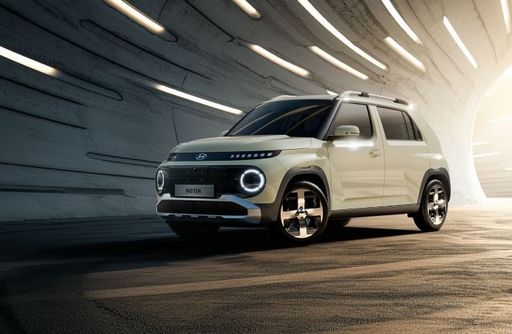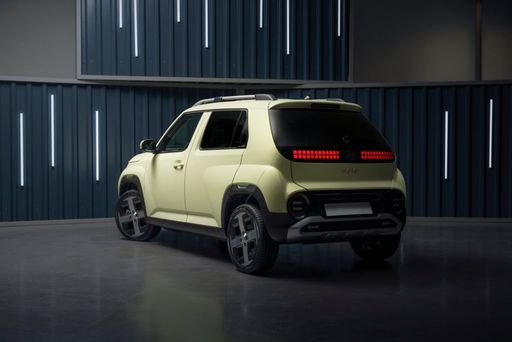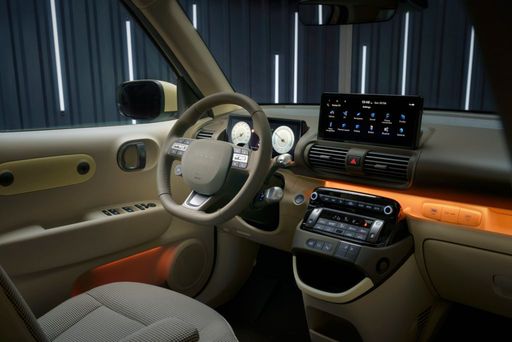Renault R5 vs Hyundai Inster – Różnice i ceny w porównaniu
Porównaj moc (540 KM vs 115 KM), bagażnik i cenę (122600 zł vs 105000 zł ) w jednym miejscu. Sprawdź, który samochód jest lepszym wyborem – Renault R5 czy Hyundai Inster.
Koszty i zużycie
Cena zakupu i efektywność to często pierwsze kryteria przy wyborze auta. Tutaj widać, który model lepiej wypada w dłuższej perspektywie – przy tankowaniu, ładowaniu lub zakupie.
Hyundai Inster ma lekko przewagę cenową – jego cena zaczyna się od 105000 zł , podczas gdy Renault R5 kosztuje 122600 zł . Różnica wynosi około 17571 zł.
Pod względem zużycia energii przewagę ma Hyundai Inster: z wynikiem 14.30 kWh na 100 km jest minimalny bardziej wydajny niż Renault R5, który zużywa 14.80 kWh. Różnica to około 0.50 kWh.
Pod względem zasięgu elektrycznego Renault R5 wypada ledwo zauważalny lepiej: osiąga do 405 km, czyli około 35 km więcej niż Hyundai Inster.
Silnik i osiągi
Moc, moment i przyspieszenie to klasyczne parametry, na których skupiają się entuzjaści – tu widać ciekawe różnice.
Pod względem mocy silnika Renault R5 ma znaczący przewagę – 540 KM zamiast 115 KM. To różnica około 425 KM KM.
W przyspieszeniu 0–100 km/h Renault R5 jest decydowany szybszy – 3.50 s wobec 10.60 s. Różnica wynosi około 7.10 s sekundy.
Różnica widoczna jest również w momencie obrotowym: Renault R5 ciągnie decydowany mocniej – 4800 Nm wobec 147 Nm. Różnica to około 4653 Nm.
Przestrzeń i praktyczność
Wnętrze, bagażnik i ładowność mają kluczowe znaczenie w codziennym użytkowaniu. Liczy się komfort i elastyczność.
Miejsca siedzące: Renault R5 oferuje nieco więcej miejsc – 5 vs 4.
Pod względem masy własnej Hyundai Inster jest ledwo zauważalny lżejszy – 1380 kg wobec 1447 kg. Różnica to około 67 kg kg.
Pod względem pojemności bagażnika Renault R5 oferuje nieco więcej miejsca – 326 L wobec 280 L. To różnica około 46 L litrów.
Pod względem ładowności Renault R5 wypada w niewielkim stopniu lepiej – 418 kg wobec 357 kg. Różnica to około 61 kg kg.
Kto wygrywa wyścig w analizie danych?
Renault R5 jest zdecydowanie lepszy w obiektywnym porównaniu danych.
Ta ocena pokazuje jedynie, który model zdobywa więcej punktów na papierze – nie który z dwóch samochodów jest dla Ciebie właściwy.
Koszty i Zużycie
Zobacz analizę szczegółową
Silnik i osiągi
Zobacz analizę szczegółową
Wymiary i Nadwozie
Zobacz analizę szczegółową
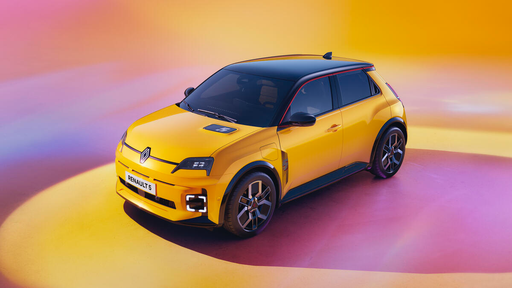
Renault R5
Renault R5
R5 to samochód z charakterem — majaczy nutą retro, ale nie boi się nowoczesnych rozwiązań, więc pasuje zarówno fanom stylu, jak i osobom szukającym praktycznego auta do miasta. Za kierownicą szybko poczujesz, że to auto nie bierze wszystkiego na poważnie: parkowanie staje się zabawą, a codzienne dojazdy nabierają lekkości.
szczegóły
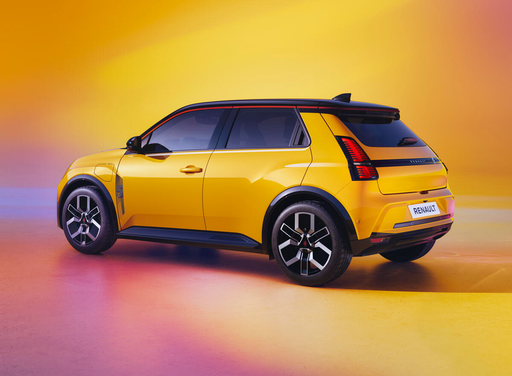
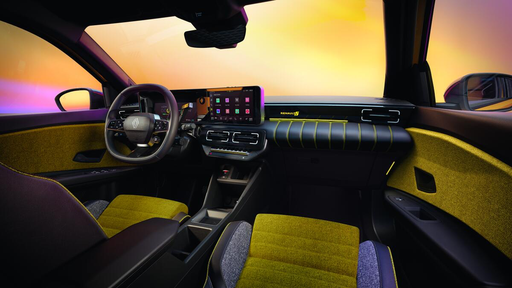
Koszty i Zużycie |
|
|---|---|
|
Cena
122600 - 702900 zł
|
Cena
105000 - 132200 zł
|
|
Zużycie L/100km
-
|
Zużycie L/100km
-
|
|
Zużycie kWh/100km
14.8 - 15.2 kWh
|
Zużycie kWh/100km
14.3 - 15.1 kWh
|
|
Zasięg elektryczny
307 - 405 km
|
Zasięg elektryczny
327 - 370 km
|
|
Pojemność baterii
40 - 52 kWh
|
Pojemność baterii
-
|
|
CO2
0 g/km
|
CO2
0 g/km
|
|
Pojemność zbiornika paliwa
-
|
Pojemność zbiornika paliwa
-
|
Wymiary i Nadwozie |
|
|---|---|
|
Typ nadwozia
Hatchback
|
Typ nadwozia
SUV
|
|
Miejsca siedzące
2 - 5
|
Miejsca siedzące
4
|
|
Drzwi
3 - 5
|
Drzwi
-
|
|
Masa własna
1447 - 1524 kg
|
Masa własna
1380 - 1433 kg
|
|
Pojemność bagażnika
326 L
|
Pojemność bagażnika
238 - 280 L
|
|
Długość
3922 - 4080 mm
|
Długość
-
|
|
Szerokość
1744 - 2030 mm
|
Szerokość
1610 mm
|
|
Wysokość
1380 - 1498 mm
|
Wysokość
-
|
|
Maksymalna pojemność bagażnika
1106 L
|
Maksymalna pojemność bagażnika
-
|
|
Ładowność
396 - 418 kg
|
Ładowność
317 - 357 kg
|
Silnik i osiągi |
|
|---|---|
|
Typ silnika
Elektryczny
|
Typ silnika
Elektryczny
|
|
Skrzynia biegów
Automatyczna
|
Skrzynia biegów
Automatyczna
|
|
Szczegóły skrzyni biegów
Reduktor
|
Szczegóły skrzyni biegów
Reduktor
|
|
Rodzaj napędu
Napęd na przednie koła, Napęd na tylne koła
|
Rodzaj napędu
Napęd na przednie koła
|
|
Moc KM
122 - 540 KM
|
Moc KM
97 - 115 KM
|
|
Przyspieszenie 0-100 km/h
3.5 - 9 s
|
Przyspieszenie 0-100 km/h
10.6 - 11.7 s
|
|
Maksymalna prędkość
150 - 270 km/h
|
Maksymalna prędkość
-
|
|
Moment obrotowy
225 - 4800 Nm
|
Moment obrotowy
147 Nm
|
|
Liczba cylindrów
-
|
Liczba cylindrów
-
|
|
Moc kW
90 - 397 kW
|
Moc kW
71 - 85 kW
|
|
Pojemność silnika
-
|
Pojemność silnika
-
|
Ogólne |
|
|---|---|
|
Rok modelowy
2025 - 2027
|
Rok modelowy
2025
|
|
Klasa efektywności CO2
A
|
Klasa efektywności CO2
A
|
|
Marka
Renault
|
Marka
Hyundai
|
Jakie rodzaje napędu ma Renault R5?
Renault R5 jest dostępny z napędem Napęd na przednie koła lub Napęd na tylne koła.

